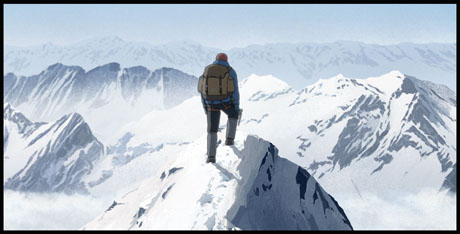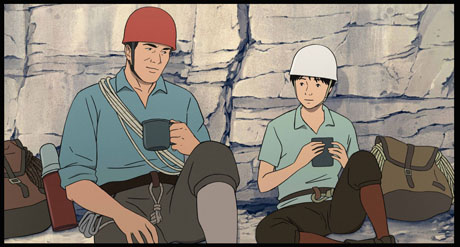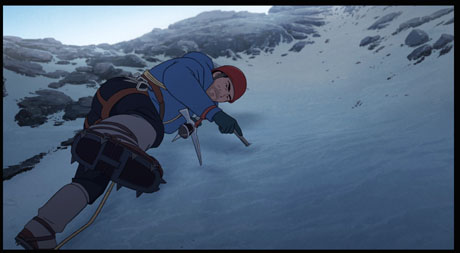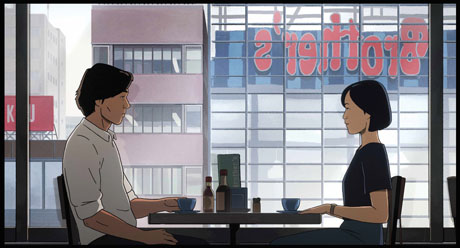
Patrick Imbert directs the incredible new animated feature The Summit of the Gods. It opens in select theaters next Wednesday November 24th and will be on Netflix Tuesday Nov. 30. Summit is based on a manga series and follows a photojournalist and a mountain climber on a journey that’s unlike anything you’ll experience while watching a film this year. (This interview with Imbert was edited for length and clarity. It was conducted virtually, over Google Meet. Imbert had a translator with him to assist in some moments.)
Jackson Murphy: Patrick, first of all, congratulations. I love this movie.
Patrick Imbert: Thank you, Jackson! Thank you so much.

JM: It’s an amazing film. I watched it at home and I still got the incredible experience of all of it. And I really liked “The Big Bad Fox”, which you made a couple of years ago. It was really funny. These two films are so different in tone. What attracted you to doing “The Summit of the Gods”?
PI: Well, when I did “Big Bad Fox”, I had been asked by Benjamin Renner to do this because he didn’t want to do all three parts of the movie. So as I was basically animation director, I became co-director. I just did what he would have done himself, I tried to. Now for “The Summit of the Gods”… it isn’t my own project. I had been proposed… offered to do that. But I quickly saw that this is something that has a great echo in me because it’s realistic and it talks about more adult themes. And I like that. After many years of working for the kids, that’s good but I was really happy to change.
JM: Adults are really going to feel the power of this deep story. What really surprised you about what you learned about photojournalists and mountain climbers?
PI: I did not know anything about mountaineering at the beginning, so I learned a lot with the internet and books. What surprised me is how these guys are able to do crazy things. They can die, but still… they do it. It’s a really good thing when you want to do drama, to do that. And regarding the photojournalism in itself, it’s a convenient position because Fukamachi first is kind of a spectator and then he becomes an actor himself. First he watches the scenes and at the end he does these things by himself. This is a narrative arch that’s really convenient.

JM: I love the parallel stories and how they come together. And you’re right about the climbers and the hikers… their perseverance. That’s one of the main themes you show in the film so well. There is a scene with Habu and a boy that we’re not going to spoil for the readers, but I found it to be so intense.
PI: Thank you. It was the most difficult scene to do in storyboard.
JM: Wow. I was gonna ask you how difficult that scene was.
PI: It’s really a tricky scene. If you don’t do it well, it is too much. It is heavy. You have to find the right balance between enough emotion and not too much. It is really difficult to do.

Patrick Imbert
PI: It is 2D animation, so it is flat. We had to create depth, and it was really important in terms of cinematography. I wanted this movie to be as realistic as possible. We don’t have many tools because it is flat – it is just drawings and paintings. We just had to do it well and think about what it is in the front and in the back. When you have to do a lens effect – what is out of focus. All these little tools that can help for the depth. Also we used a lot of atmospheric stuff in order to create the depth. When there is snow in the air, the back is really drawn. All of these little details help to create the depth but also light and colors of course.
JM: You do a lot of great things with light. And I really like looking at some of those wide, landscape moments – trying to see the little movements of the people. They’re so tiny within the mountains. How difficult was it? Your eyes wanna look at everything and then you notice, “Wait, there’s a little movement from a person there.”
PI: That is really easy, in fact, because the eye is used to follow what is moving. You just have to make something moving, even if it’s not well designed. Moving is enough. And you see it. The film is based on a progression. In the first part, we start very close to the characters during a lot of dialogue scenes. The more we go in the movie, the more we have big shots. In the last part, in Everest, this is the time where we have the biggest shots and the smallest characters. It’s based on a progression.
JM: And in the last part of the film, you decide to let music and sound effects and only a little bit of dialogue guide us through that last portion, which I thought was a fantastic decision. Why did you decide to make that decision?
PI: Well, it was just logical in terms of progression. When you have dialogue scenes, of course you have dialogues, when the people talk. And then when they start to climb, they [make] some efforts and they kind of talk. They must not talk to each other. This is the rule. They have to not communicate, so they are both alone, even if they are close. This is the time to let the mountain talk with the sound design and music. Each in its own place, in its own place.

JM: It adds to the emotion and power. Also this film has my favorite score of the year. How was it working with Amin Bouhafa on the music?
PI: I didn’t know Amin before we met on this project. It was a great meeting. We learned to work with each other. We have the same way to think. We always search for the right thing to do. Even if we had to do it 10 times, we do it 10 times. I do this for the drawings… for the image and he’s able to do it with the music. He never told me that he was annoyed to redo. But if he was feeling that I was unhappy with the result, he would say, “Okay, forget it, even if it’s the tenth time I do it. We will try to do something else.” The music is part of the narrative. It helped me to give meaning at every scene. Sometimes when he asked me, “What do you want to tell with such a scene?” most of the times I knew but sometimes I didn’t know. So I had to precise it and he helps me with the music to define the right meaning. This helps the movie.
JM: I hope the music gets nominated for some major awards because it’s really good, as is the film. And we’ll get into the movie’s awards chances in a little bit here. I wanna ask you about Fukamachi and Habu’s relationship because as I’m watching it, especially in the final portion of the movie, I feel like it’s one of the most unique on-screen relationships that I’ve seen in a long time. How do you feel it’s unique?
PI: I tried to do what seemed logical to me. They are not friends, so I didn’t want to make them pals. Habu is quite boarish. They don’t know each other and Habu doesn’t really need Fukamachi because he just wants to do the things by himself. But: as Fukamachi gives a lot of effort to follow him, [Habu] can recognize this obsession that he has himself for climbing. So he knows that you cannot prevent someone to do what they want to do.
JM: Very true.
PI: He recognizes that part of himself in him. On this point, they are similar. I wanted to create this proximity, but it’s not a real relationship.

(At this moment in our conversation, we discuss a few elements that would spoil that overall experience of the movie. However, we get into a point about characters feeling guilt.)
PI: I feel the guilt, and other negative feelings, are really good for drama. If everything goes well for a character, there is no drama. But if Habu loses the competition… if he has a lot of problems… if he has obstacles… this is good for drama.
JM: Definitely. If you were to climb Mount Everest… after making this movie and learning all about this world and this profession… what would you make sure you would want to bring with you as you were climbing up?
PI: Well, this is not a question for me because I will never climb Mount Everest. Definitely. It is too cold. It is too difficult. No, no, no.
JM: (laughs)
PI: But you know what? I met a French summiter (the guys who reach the summit). And he told me that you spend a lot of time in your tent during all the base camp adaptation time and also during the climbing because you have to sleep all night in the tent. And you have to bring a good book.
JM: A good book to read. Nice. I hope it’s a good one! I truly believe this film deserves to receive Critics Choice, Annie and Academy Award nominations in the [Best] Animated Feature category. What would that mean to you?
PI: Honestly, it’s pleasant to receive an award. Of course this is good. But if I have some or not, this is not really important because I did my job. I did my part of the job. Whatever happens next, it’s really none of my business. But all [good] if I had… awards, of course.
- INTERVIEW: “Inside Out 2” Director And Producer On Pixar Sequel - April 16, 2024
- INTERVIEW: “Puffin Rock And The New Friends” And 25 Years Of Cartoon Saloon - April 10, 2024
- INTERVIEW: “Chicken For Linda!” Directors On Annecy Winning Feature - April 9, 2024


 November 17th, 2021
November 17th, 2021  Jackson Murphy
Jackson Murphy  Posted in
Posted in  Tags:
Tags: 






